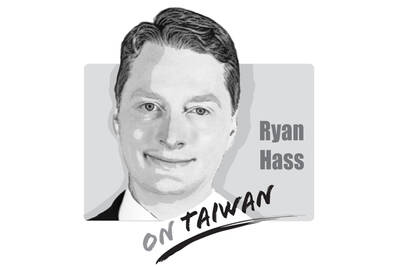According to news reports, multinational hotel chain Marriott International Inc listed Hong Kong, Taiwan, Macau and Tibet as “separate countries” in an online customer questionnaire and this triggered the Chinese government to order that Marriott shut down its Chinese Web site and mobile application for a week as punishment. The hotel giant has by now issued three apologies for its mistake.
The US’ Delta Air Lines was also called out by the Chinese government for listing Taiwan and Tibet as separate countries. However, after its executives were summoned, the airline continued to list Taiwan, Thailand and Japan as separate countries in the Asia-Pacific region on its official Web site.
This time, there was no China in the country list, as the country’s name was instead replaced by the Chinese word for “porcelain” (瓷器). Was Delta Air Lines making an American-style joke or was it just a careless mistake that surely will further infuriate China? It makes one curious to see what is going to happen next.
Seeing foreign airlines and other businesses that make their livings in China listing Taiwan as a separate country makes China hopping mad as it urges these companies to publish apologies, alter their content and make immediate amendments. Is China going nuts? The answer, of course, is no.
The territory of China — which claims to have a 5,000-year-long history — has been subject to constant changes throughout the different dynasties. Dynasties aside, the demarcation of its territory has also undergone significant changes even within single dynasties. Taiwan was Chinese territory for only 211 years — under the rule of the Qing dynasty — and China’s claims over the Diaoyutai Islands (釣魚台) and the South China Sea are even weaker.
Even though this is a historical fact, China keeps lying through its teeth by claiming that Taiwan, the Diaoyutai Islands and the South China Sea have belonged to China since ancient times. Such claims show that China is not crazy, but dull and a scoundrel.
It is undeniable that it places Taiwan in a difficult situation internationally, as foreign airlines and other businesses one after the other bow to the Chinese yuan. There is very little that Taiwan can do about this. However, as the saying goes, “a noble man makes his fortune in a noble way.”
The University of Texas at Austin, for example, afraid that its campus was being infiltrated by the Chinese government, knew to reject a proposed donation from the Hong Kong-based China United States Exchange Foundation, whose chairman, former Hong Kong chief executive Tung Chee-hwa (董建華), also serves as vice chairman in the Chinese People’s Political Consultative Conference.
Some food manufacturers in Taiwan that export their products to China, on the other hand, are absolutely undignified in marking their products as “made in Taiwan, China” as long as they can make a profit by selling their merchandise to China. Now, China has drawn another red line, requesting that Taiwanese manufacturers mark their products as made in the “Taiwan Area” or in “Taiwan Area, China.”
If President Tsai Ing-wen’s (蔡英文) government does not set its own red lines and chooses to turn a blind eye to those businesses, such firms will not only sell their products, they will also sell out Taiwan’s sovereignty and national dignity.
Chang Kuo-tsai is a retired associate professor at National Hsinchu University of Education and a former deputy secretary-general of the Taiwan Association of University Professors.
Translated by Chang Ho-ming

There has been much catastrophizing in Taiwan recently about America becoming more unreliable as a bulwark against Chinese pressure. Some of this has been sparked by debates in Washington about whether the United States should defend Taiwan in event of conflict. There also were understandable anxieties about whether President Trump would sacrifice Taiwan’s interests for a trade deal when he sat down with President Xi (習近平) in late October. On top of that, Taiwan’s opposition political leaders have sought to score political points by attacking the Lai (賴清德) administration for mishandling relations with the United States. Part of this budding anxiety
The diplomatic dispute between China and Japan over Japanese Prime Minister Sanae Takaichi’s comments in the Japanese Diet continues to escalate. In a letter to UN Secretary-General Antonio Guterres, China’s UN Ambassador Fu Cong (傅聰) wrote that, “if Japan dares to attempt an armed intervention in the cross-Strait situation, it would be an act of aggression.” There was no indication that Fu was aware of the irony implicit in the complaint. Until this point, Beijing had limited its remonstrations to diplomatic summonses and weaponization of economic levers, such as banning Japanese seafood imports, discouraging Chinese from traveling to Japan or issuing
On Nov. 8, newly elected Chinese Nationalist Party (KMT) Chairwoman Cheng Li-wun (鄭麗文) and Vice Chairman Chi Lin-len (季麟連) attended a memorial for White Terror era victims, during which convicted Chinese Communist Party (CCP) spies such as Wu Shi (吳石) were also honored. Cheng’s participation in the ceremony, which she said was part of her efforts to promote cross-strait reconciliation, has trapped herself and her party into the KMT’s dark past, and risks putting the party back on its old disastrous road. Wu, a lieutenant general who was the Ministry of National Defense’s deputy chief of the general staff, was recruited
The Food and Drug Administration (FDA) on Nov. 5 recalled more than 150,000 eggs found to contain three times the legal limit of the pesticide metabolite fipronil-sulfone. Nearly half of the 1,169 affected egg cartons, which had been distributed across 10 districts, had already been sold. Using the new traceability system, officials quickly urged the public to avoid consuming eggs with the traceability code “I47045,” while the remainder were successfully recalled. Changhua County’s Wenya Farm — the source of the tainted eggs — was fined NT$120,000, and the Ministry of Agriculture instructed the county’s Animal Disease Control Center to require that